The poetry of migration
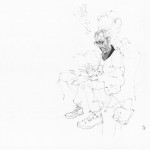
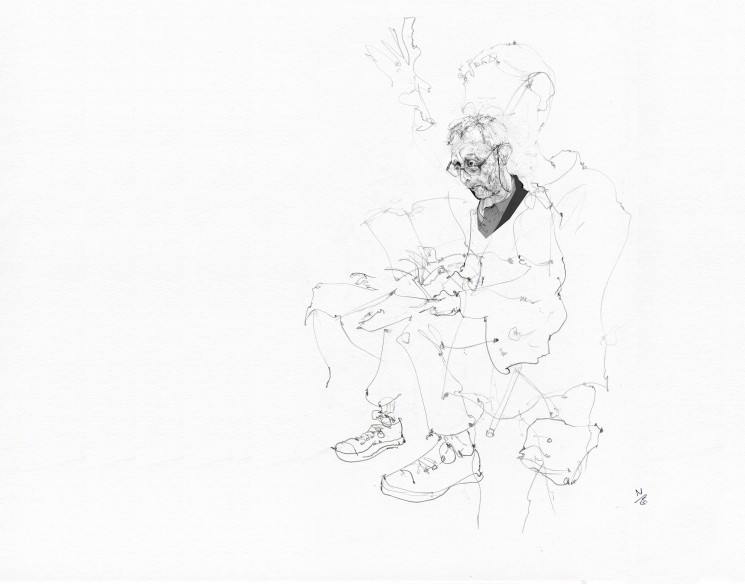
Michael Rosen, compering the ‘Poetry of Migration’ event at Londonewcastle Project Space earlier this year; drawing by Nick Ellwood.
One of the first events we held in the course of our three-week residency at Londonewcastle this summer (where more than 4,000 people visited our exhibition Call Me By My Name: Stories from Calais and Beyond) was the ‘Poetry of Migration’ on Tuesday 6 June. Michael Rosen (distinguished poet, writer, entertainer – and distinguished friend of the Migration Museum Project) compered the event, at which Ruth Padel and Jackie Kay were fellow guest speakers.
When we’d advertised the event, we had also asked people to let us know if they would like to present their own poems, so the evening was less about studious, respectful listening to the panel poets – though it was that, too – and more about participation. People presented their poems from the floor – Sophie Herxheimer, PJ Samuels, Antoine Cassar, Nadia Faydh and Elizabeth-Jane Burnett among them – and the audience expressed the full range of response you might have expected from an evening of poetry based around the theme of migration: tears, laughter, some anger, some despair. As a curtain-raiser for the exhibition itself, it was perfectly judged.
Nick Ellwood, the artist behind the panel drawings of Jungle residents in the middle room, sat in the audience and drew portraits of some of the performers. We’ve reproduced his drawings in this blog, together with some of the poems read out by the people he was drawing. It’s a rich combination: one of the artists we were privileged to work with for the exhibition producing beautiful sketch drawings of some of the incredibly talented writers we were thrilled to have perform at the event. We hope you enjoy this memento of the evening.
Ruth Padel
Purple Ink
She has waited three years for this. Too ashamed
to even half-tell the young woman in spectacles
tapping a purple biro on a desk
exactly what the soldiers did to her, each versatile
in his turn, she gets wrong Date your mother was born
and sees a stamp the colour of desert night descend on her file.
The Prayer Labyrinth
She went looking for her daughter. How many
visit Hades and live? Your only hope
is the long labyrinth of Visa Application
interviews with a volunteer from a charity
you’re not allowed to meet. You’ve been caught:
by a knock on the door at dawn
or hiding in a truck of toilet tissue
or just getting stuck in a turn-stile.
You’re on Dead Island: the Detention Centre.
The Russian refugees who leaped from the fifteenth floor
of a Glasgow tower block to the Red Road
Springburn – Serge, Tatiana and their son,
who when the Immigration officers
were at the door, tied themselves together
before they jumped – knew what was coming.
Anyway you’re here. Evidence of cigarette
burns all over your body has been dismissed
by the latest technology. You’re dragged
from your room, denied medication
or a voice. You can’t see your children,
they’re behind bars somewhere else.
You go on hunger strike. You’re locked
in a corridor for three days without water
then handcuffed through the biopsy
on your right breast. You’ve no choice
but to pray; and to walk the never-ending path
of meditation on not yet. Your nightmare
was home-grown; you’re seeking sanctuary.
They say you don’t belong. They give you
a broken finger, a punctured lung.
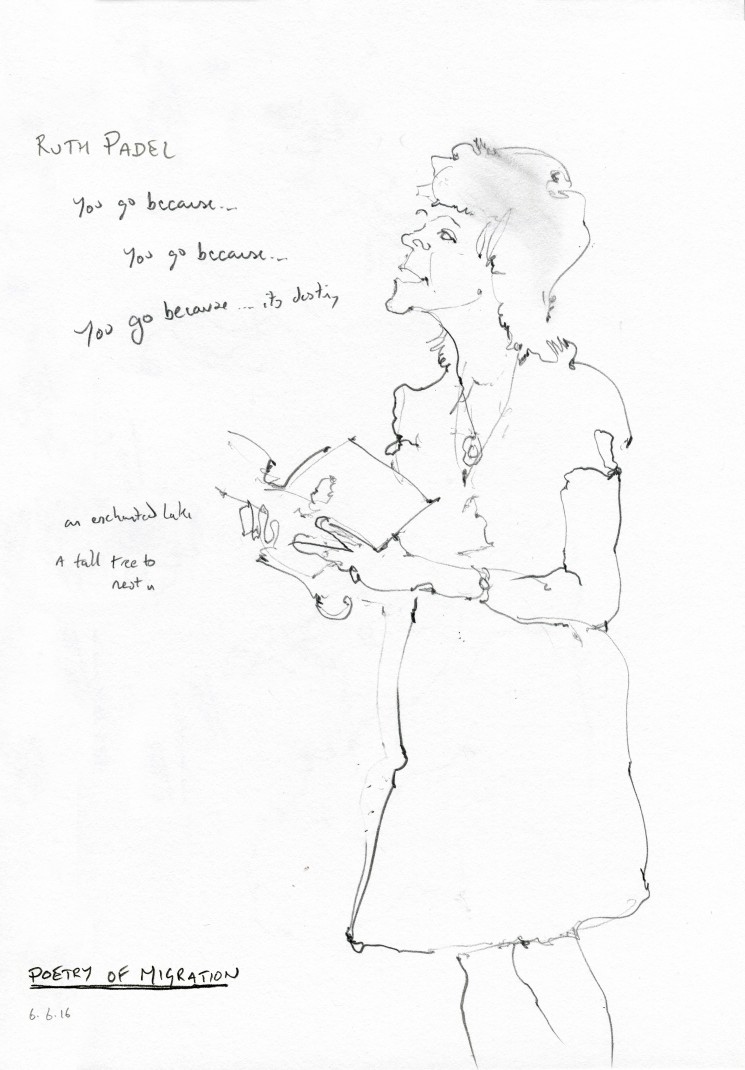
Ruth Padel, reading her poem ‘Time to Fly’; drawing by Nick Ellwood.
Time to Fly
You go because you heard a cuckoo call. You go because
you’ve met someone, you made a vow, there are no more
grasshoppers. You go because the cold is coming, spring
is coming, soldiers are coming: plague, flood, an ice age,
a new religion, a new idea. You go because the world rotates,
because the world is changing and you’ve lost the key.
You go because you have the kingdom of heaven in your heart.
And the kingdom of hell has taken over someone else’s heart.
You go because you have magnetite in your brain, thorax, tips
of your teeth. Because there’s food over the hill
and there’ll be gold, or more likely bauxite,
inside the hill. You go because your mother is dying
and only you can bring her the apples of the Hesperides.
You go because you need work.
You go because astrologers say so. Because the sea
is calling and your best friend bought a motorbike
in America last year. You go because the streets are paved
with gold and your father went when he was your age.
You go because you have seventeen children and the Lord will provide;
because your sixteen brothers have parcelled up the land
and there’s none left for you. You go because the waters are rising,
an ice sheet is melting, the rivers are dry
there are no more fish in the sea. You go because God
has given you a sign – you had a dream – the potatoes are blighted.
Because it is too hot, too cold, you are on a quest for knowledge
and knowledge is always beyond. You go because it’s destiny,
because Pharoah won’t let you light candles at sundown on Friday.
Because you’re looking for
an enchanted lake, the meaning of life, a tall tree to nest in.
You go because travel is holy, because your body
is wired to go, you’d have a quite different body and different brain
if you were the sort of bird that stayed. You go
because you can’t pay the rent: creditors lie in wait for your children
after school. You go because Pharoah has hogged the oil,
electricity and paraffin so all you have on your table
are candles, when you can get them.
You go because there’s nothing left to hope for;
because there’s everything to hope for and all life is risk.
You go because someone put the evil eye on you
and barometric pressure is dropping. You go because
you can’t cope with your gift – other people can’t cope with your gift –
you have no gift and the barbarians are after you.
You go because the barbarians are gone, Herod
has turned off the internet and mobile phones, the modem
is useless and the eagles are coming. You go because the eagles
have died off with the vultures and the ancestors are angry
there’s no one to clean the bones. You go in peace, you go in war.
Someone has offered you a job. You go because your dog
is going too. Because the Grand Vizier sent paramilitaries to your house last night
you have to go quick and leave the dog behind.
You go because you’ve eaten the dog and that’s it, there’s nothing else.
You go because you’ve given up and might as well. Because your love
is dead – because she laughed at you; because she’s coming with you,
it will be a big adventure and you’ll live happily ever after.
You go in hope, in faith, in haste, high spirits, deep sorrow, deep
snow, deep shit and without question.
You pause halfway to stoke up on Omega 3 and horseshoe crabs.
You go for phosphorus, myrtle-berries, salt. You go for oil
and pepper. It was your father’s dying wish.
You go from pole to pole, you go because you can,
you have no feet, you sleep and mate on the wing.
Because you need a place to shed your skin
in safety. You go with a thousand questions but you are growing up,
growing old, moving on. Say goodbye to the might-have-beens –
you can’t step into the same river twice.
You go because hope, need and escape
are names for the same god. You go because life
is sweet, life is cheap, life is flux
and you can’t take it with you. You go because you’re alive,
because you’re dying, maybe dead already. You go because you must.
© Ruth Padel from The Mara Crossing, Chatto and Windus, 2012
Sophie Herxheimer
London
Not zo mainy Dais zinz ve arrivink.
Zis grey iss like Bearlin, zis same grey Day
ve hef. Zis norzern Vezzer, oont ze demp Street.
A biet off Rain voant hurt, vill help ze Treez
on zis Hempstet Heese vee see in Fekt.
Vy shootd I mind zat?
I try viz ze Busses, Herr Kondooktor eskink
me … for vot? I don’t eckzectly remempber;
Fess plees? To him, my Penny I hent ofa –
He notdz viz a keint Smile – Fanks Luv!
He sez. Oh! I em his Luff – turns Hentell
on Machine, out kurls a Tikett.
Zis is ven I know zat here to settle iss OK. Zis
City vill be Home, verr eefen on ze Buss is Luff.
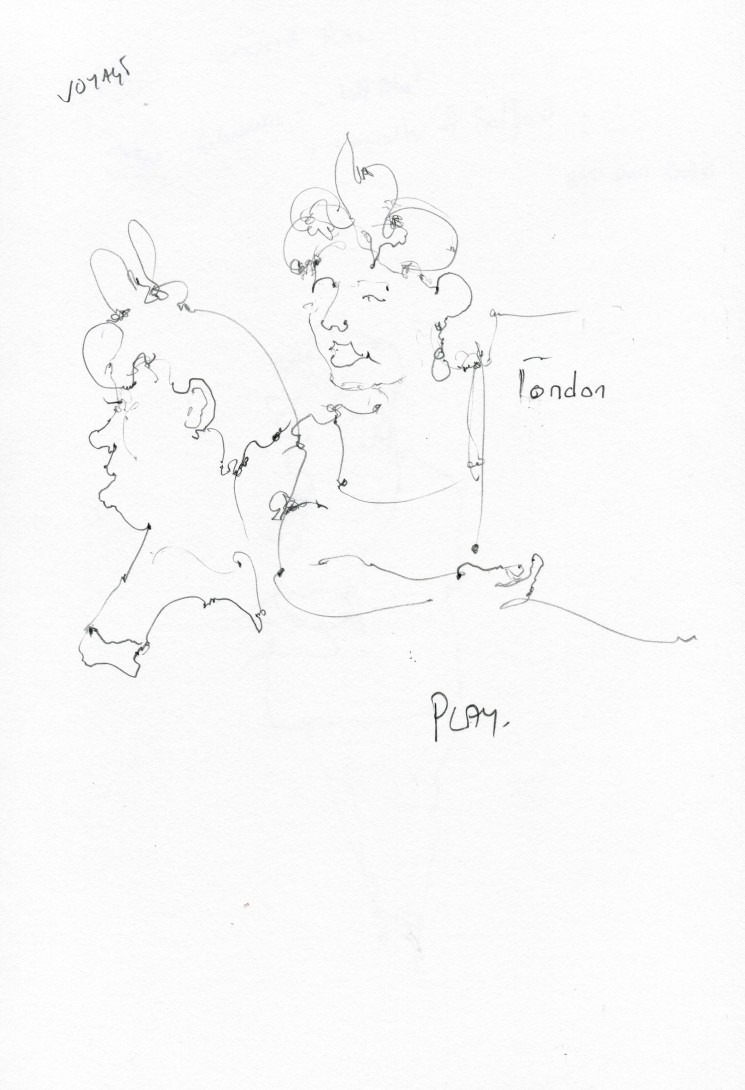
Sophie Herxheimer, drawn in full flow when reading ‘London’; drawing by Nick Ellwood.
Vosch by Hendt, Lern by Hart!
Ze yunkest off my grayt grayt
Grent-Childtrenn is lynink up
her Dollse oont Behrs for Klarse.
Ven zay slump in rekggitt
Exhorstschon, she arraintches zem
to lean on ze Kupboart. Zit up ztrate!
She Kommarnts. If Enny Vun
off you nose ze Aanser, don’t
schout out; poot up your Hendt!
Ze Svetter zat zis Teacher
vairs, looks ottley familiar.
Ze Vun Aunt Frieda sent from Vienna
for my Girl ven she voz small.
I see ze Vool still hess some Bountz.
Oont amazinkly, no Moss Holse!
Funny Frieda alvays sett she dittn’t
leik to knit: I heffnt ze Payschunz,
she leidt. Zis Svetter hess en intrikett
Pettern off blue Skvairs, raist in a Ridch
ofa nice veit Stokkink Stitch –
I marfellt et it zen, ven it arrifte, springink
like a Lemm from stiff brown Paper.
Vizzin Veeks of zat, Frieda, leik zo Menny,
voz seeztd, imprissont, murdtert.
Now zis endurink Laybor off hurze
iss vorn ess a Keint off Uniform:
kommarntink All who are born, or eefen
stufft: Make Sinks. Make Sinks up! Play!
© Sophie Herxheimer
‘London’ first appeared as no.22 in a series of concrete poetry broadsides from Brazil, called POW, subsequently appearing in Jewish Quarterly and Long Poem Magazine, and was also made into a film.
‘Vosch by Hendt, Learn by Hart’ has just been published in the Vanguard Anthology.
Nadia Faydh
Things I miss
When I wake up to the cloudy sky
Of London,
I feel overwhelmed:
A fit of yearning.
It is not that I want to go back,
but simply miss the way it was:
The sunny mornings,
The fresh smell of Cardamom
My mother used to make with tea
Or the smell of fresh bread,
When my father is back from the bakery …
Maybe I miss those Fridays,
When all the sisters gather around;
Voices of playing kids
Filling the air with delicious noise,
“the house can’t take us all,”
I would say,
My mother would stop me…
She likes it when we’re all there.
Maybe I miss dad’s big smile:
when his granddaughters
Greet him with a kiss.
I miss watching all the girls
Working in the kitchen,
Or Sit to the table laughing loud …
Dad would come in, take a picture,
To remember those moments I miss!
© Nadia Faydh
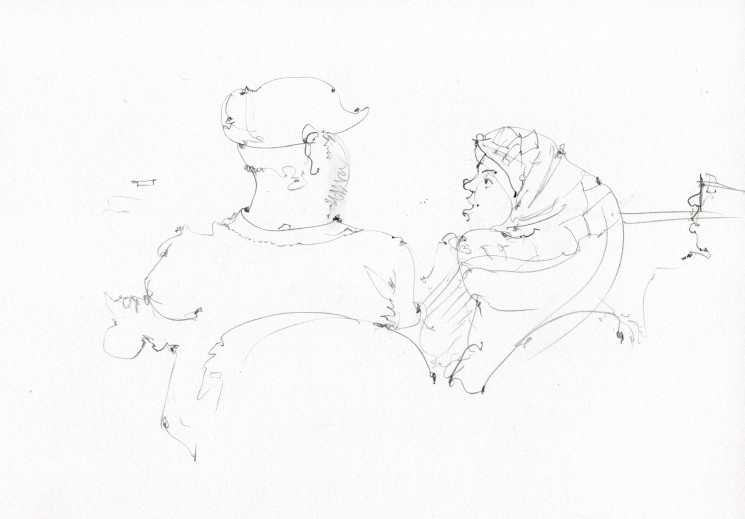
Guest readers at the event – Antoine Cassar on the left, Nadia Faydh on the right; drawing by Nick Ellwood.
Antoine Cassar
8 ħajki bla fruntieri
8 no-border haiku
1
L-ajruport. Tifel
ċkejken jaqbeż iċ-checkpoint.
Ma jafx b’fruntieri.
The airport. Boy leaps
over the customs checkpoint.
He knows no borders.
2
Tfajjel Sirjan
fuq il-kanvas tat-tinda
ipinġi d-djar.
A Syrian boy
paints houses on the canvas
of his tent.
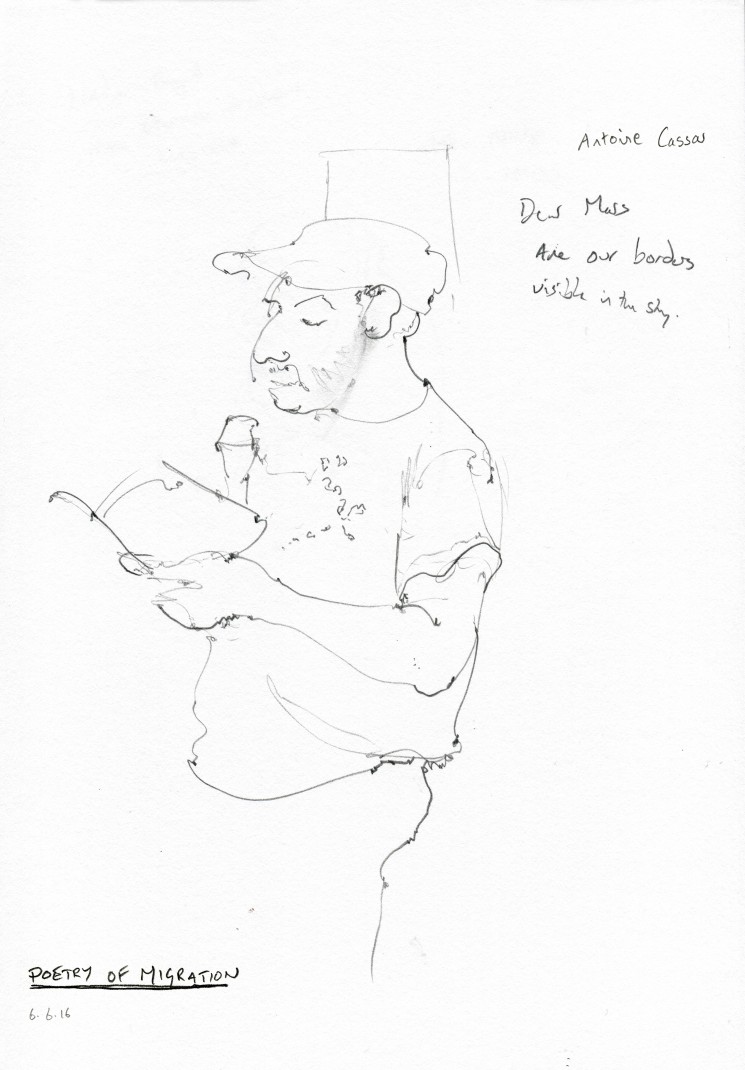
Antoine Cassar, drawn by Nick Ellwood.
3
L-ebda bandiera
ma jistħoqqilha qima
daqs l-id li tħitha.
No flag, large or small,
deserves greater esteem than
the hand that sews it.
4
Il-bnedmin jaqsmu
l-fruntieri? Anzi. Il-fruntieri
jaqsmu ’l-bnedmin.
People cross borders.
It’s been that way ever since
borders crossed people.
5
Għeżież nies ta’ Mars:
jidhru l-fruntieri tagħna
fis-sema tagħkom?
Dear people of Mars:
are our borders visible
in your evening sky?
6
Ewropa! Intix
tisma’ l-imħabba ssejjaħ
minn qiegħ il-baħar?
Europe! Can you not
hear love calling out from the
bottom of the sea?
7
Għidli ftit, baħar,
kif għadek tmelles l-art
li tridek qabar?
Would you tell me, sea,
why you still caress the land
that has made you a grave?
8
Id-dinja tonda?
Saqsi lir-riħ, u ‘l-fens
mal-art ta’ Calais …
Is the world not round?
Ask the wind. Ask the Calais
fence, blown to the ground d…
Elizabeth-Jane Burnett
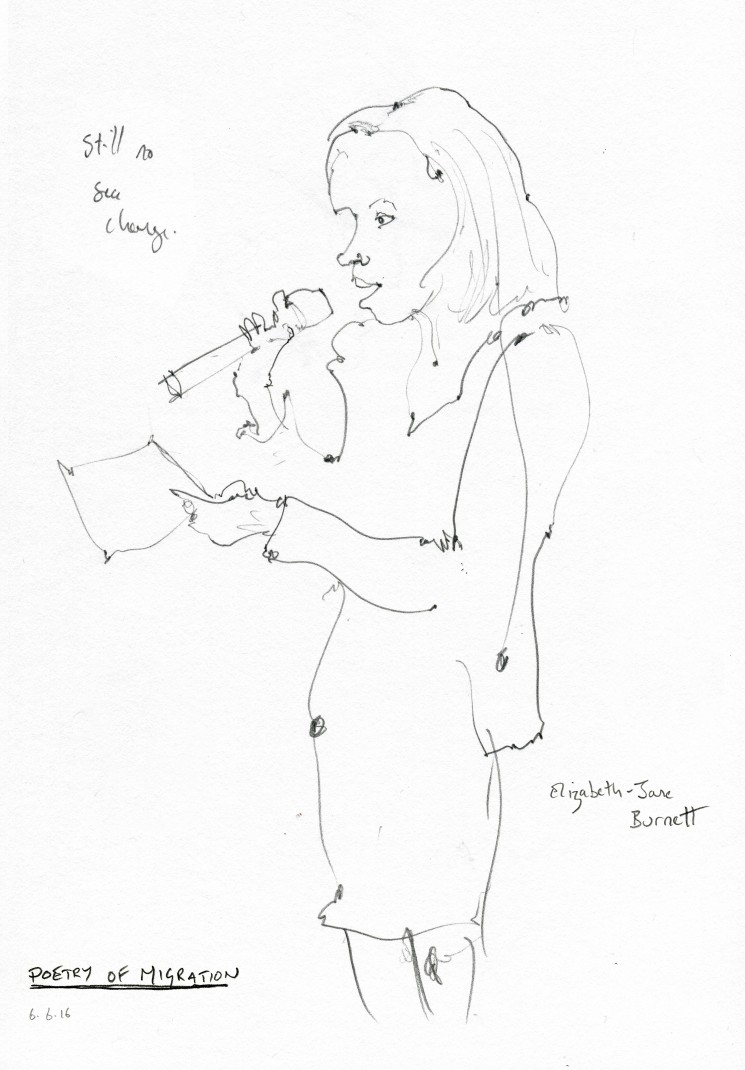
Elizabeth-Jane Burnett, drawn by Nick Ellwood.
Talking to Ariel about Our Place in the Canon and Other Sea-Nymph Stuff
What did you notice, apart from the cold?
“It was –4 and three inches of snow.”1
What words will you choose to speak for you, whose
archive to bootleg to send over To:
recipients of black body unable to process except as appropriation or lost thing searching for warm amputations please
find history attached
in a speech of the eyes which do not lie or sound
as a Dali sequence of cuts let us process each other
through peel of vitreous fluid let us touch another fathom falls
as we see what we are made of: these yellow sands, these light bones
pulse as snowdrops through the dead days of autopsy:
still no sea-change.
1 Sam King, aged 81, a migrant from Priestmans River, Jamaica, to Bexley, Kent.
PJ Samuels
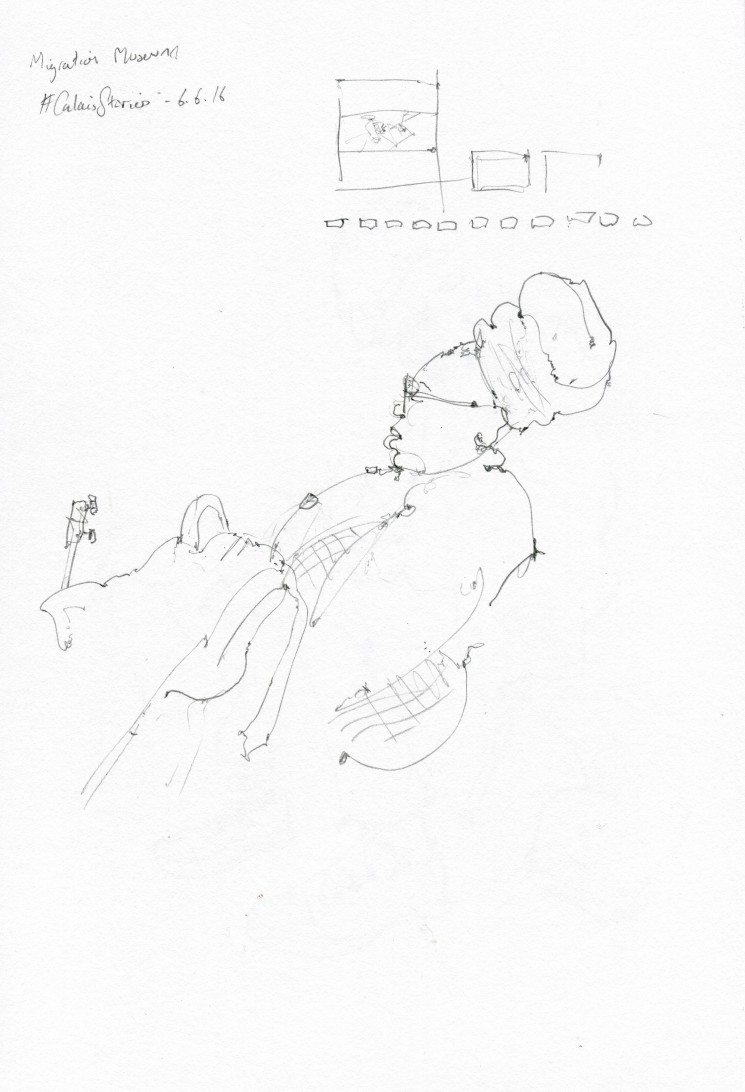
PJ Samuels, drawn by Nick Ellwood.
Whittle
I didn’t come here under a lorry
with bin liners over my head
so the carbon dioxide readers
cannot sense my breath
I didn’t sail here on a rubber dingy
and watch my brothers and sisters
become food for sea creatures
I didn’t cross a continent over land
needing to buy a new passport
and acquire a new name
at each border crossing
I am from Jamaica
Called the pearl of the Caribbean Sea
It is beautifully idyllic
My land is not torn apart by war
Just chained by terminal culture norms
I was on last rites
I bought a ticket, flew British Airways
Was served vodka and lemon en flight
Here I am
Tell me your story you said
Here is the altar, worship I brought me
And you made of me a sacrifice
Systematically stripped me
Peeled back my flesh
and pulverized my bones
Whittled me down to who I fuck
To how I fuck
To when I learned what fuck was
To how many times did you fuck her
what exactly did you do
Torn apart by need
whittled
Whittle
To cut small bits or pare shavings from
To reduce or eliminate gradually
To cut or shape wood with a knife.
Not a word much used
to describe a human being
But in your eyes, am I human?
You taught me inconsequential.
I brought the best of me
and had to learn that what you really wanted
was no part of me
With your callused carpenter’s hands
you whittled me down
to what you find consumable
there, you said,
I have made you beautiful
See how good I am to you?
here I am
your Pygmalion
your Aphrodite’s blessing
your social experiment
your triumph
Don’t I wear your guilty well?
Always with the dichotomy
of gratitude and grief
Wracked by survivors’ guilt
I sorrow for fragments of me left
in a land across waters
But it’s the pieces you took that remade me warrior
A constant itch under skin
I sit on the fence
vacillating between thank you and fuck you
And knowing even so
I am one of the lucky ones
Michael Rosen
Madame le Pen
Mme Le Pen,
la raison pourquoi
on a donné une étoile jaune
à l’oncle et à la tante de mon père
la raison pourquoi
on a demand qu’ils devaient attacher
une affiche disante ‘Enterprise juive’
à leur étal de marché
la raison pourquoi
ils ont fuit leur asile
dans la rue Mellaise à Niort
la raison pourquoi
ils se sont réfugiés à Nice
la raison pourquoi
on les a arrêtés et on les a transportés
à Paris, à Drancy, à Auschwitz et à leurs morts
est parce que
les officiers de Vichy
ont fait un ‘Fishier juif’ des juifs étrangers
et l’a donné aux Nazis au moment exacte
que la Résistance a dit bienvenu aux juifs
bienvenu aux étrangers
et c’est ça, la raison pourquoi
je vous dis ces choses
Mme Le Pen.
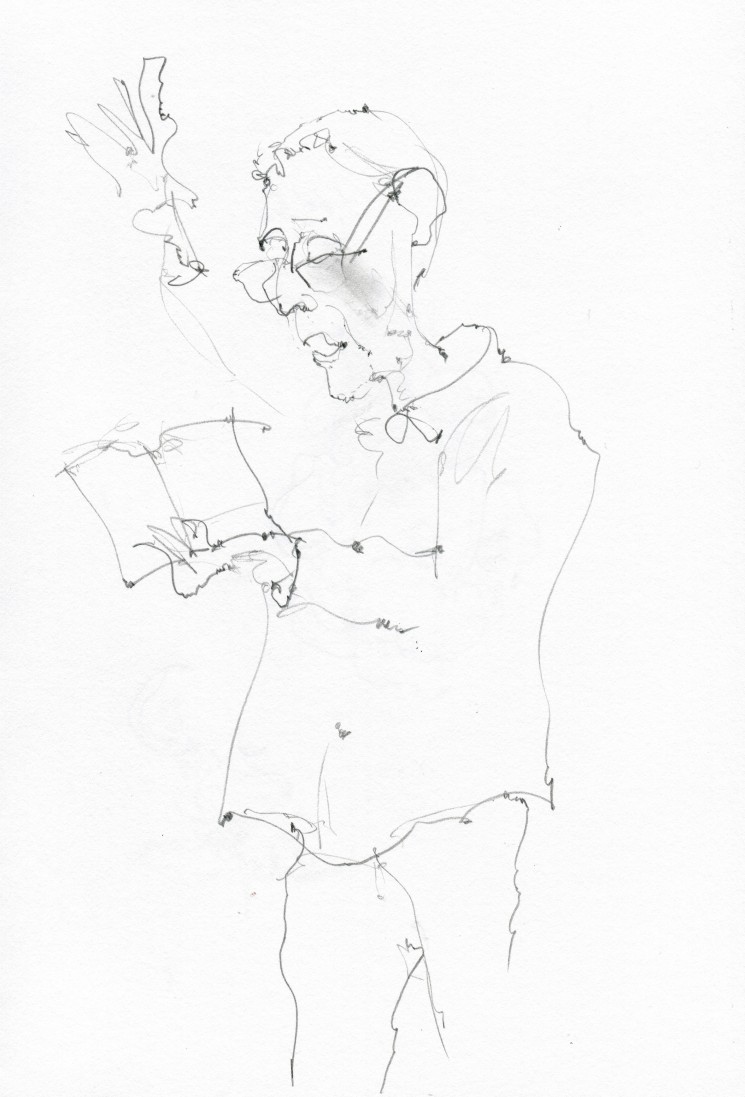
Michael Rosen, reciting his poem ‘To Madame le Pen ’; drawing by Nick Ellwood.
Mme Le Pen,
the reason why
they gave a yellow star
to my father’s uncle and aunt
the reason why
they told them they had to fix a sign
saying ‘Jewish Business’ on their market stall
the reason why
they fled from their refuge in the rue Mellaise
in Niort
the reason why
they took refuge in Nice
the reason why
they were arrested and transported
to Paris, to Drancy, to Auschwitz and to their death
is because the officials of Vichy
made a ‘Jewish File’ of foreign Jews
and gave it to the Nazis
at the exact moment
that the Resistance was welcoming
Jews and was welcoming foreigners
and that’s the reason why
I am telling you these things
Mme Le Pen.
Mother Father Cable Street
You Connie Ruby Isakofsky
From Globe Road in Bethnal Green
You Harold Rosen
From Nelson street, Whitechapel
You Connie with your mother and father
From Romania and Poland
You Harold with your family from Poland
You Connie
You Harold
your families working in the rag trade
Hats, caps, jackets and gowns
Hats, caps, jackets and gowns
You both saw Hitler on the Pathe News
You both saw Hitler Blaming the Jews
You both collected for Spain,
collecting for Spain
When Franco came
When round the tenements,
the whisper came
Mosley wants to march
Here, through the East End
So what should it be?
To Trafalgar Square to support Spain:
No pasaran?
Or to Gardiners Corner to support Whitechapel:
They shall not pass.
Round the tenements
The whisper came
Fight here in Whitechapel
The whisper came:
Winning here
We support
Spain there.
These are the streets where we live
These are the streets where we go to school
These are the streets where we work
They shall not pass.
You Connie
You Harold
Went to Gardiner’s Corner
You went to Cable Street
You piled chairs on the barricades
The mounted police charged you
A stranger took you indoors
To escape a beating
And thousands
Hundreds of thousands came here
Fighting Mosley
Supporting Spain
Thinking of Germany
And
Mosley did not pass.
You Connie
You Harold
Said, today the bombs on Guernica in Spain
Tomorrow the bombs on London here.
And you were bombed
the same planes, the same bombs
landing in the same streets
where you had said
they shall not pass
And the bodies
piled up across the world
Million after million after million after million
You Connie, your cousins in Poland
Taken to camps
Wiped out
You Harold, your uncles and aunts in France and Poland
Taken to camps
Wiped out.
But you Connie, my mother
You Harold, my father
You survived
You lived
We were born
We grew
You mother
You father
told us these things
I write these things
And today,
I tell you these things
We remember here together
Thanks to you
And we say:
They shall not pass.
© Michael Rosen

